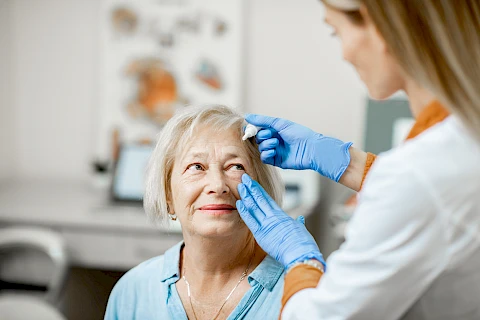
Dry eye syndrome is a common condition that affects many seniors. It occurs when the eyes don't produce enough tears or when the tears evaporate too quickly. This condition can cause discomfort and lead to more serious eye issues if not managed properly. It's important to address dry eyes in seniors to ensure their comfort and overall eye health.
Senior Helpers Berkeley will guide caregivers on managing dry eye syndrome in their senior loved ones.
What Is Dry Eye Syndrome?
Dry eye syndrome can present a range of symptoms. Recognizing these symptoms early can help manage and alleviate the discomfort. Common symptoms of dry eye syndrome include itching, burning, redness, and blurred vision. These symptoms can be bothersome and may affect a senior's quality of life.
Causes of Dry Eye Syndrome in Seniors
Several factors can contribute to dry eye syndrome in seniors:
- Aging: As people age, tear production often decreases, leading to dry eyes.
- Medications: Some medications, such as antihistamines and blood pressure drugs, can reduce tear production.
- Medical conditions: Arthritis, diabetes, and thyroid problems can also cause dry eyes.
There are several strategies that caregivers can use to help manage dry eye syndrome in seniors. These approaches can make a big difference in reducing discomfort. Artificial tears are a common and effective way to alleviate dry eye symptoms. When applying artificial tears, make sure to wash your hands thoroughly and gently pull down the lower eyelid before squeezing a drop into the eye.
Maintaining a Humidified Environment
Keeping the air humid can be very helpful in managing dry eye syndrome in seniors. Using a humidifier can add moisture to the air, making it easier on the eyes. Place the humidifier in the rooms where the senior spends the most time and check the humidity levels to keep them between 30-50%.
Seniors should also take regular eye breaks, especially when engaging in activities that strain the eyes, like reading or watching TV. Taking breaks helps reduce eye strain and dryness. Encourage activities such as the "20-20-20 rule" where every 20 minutes, look at something 20 feet away for at least 20 seconds.
Proper Nutrition and Hydration
Diet and hydration also play a role in eye health. Include foods rich in Omega-3 fatty acids, such as salmon and flaxseeds. Leafy greens like spinach and kale are also beneficial. Encourage drinking plenty of water throughout the day to keep the whole body, including the eyes, well-hydrated. If the senior continues to experience symptoms despite home remedies, consult a healthcare professional.
Regular eye check-ups can help in the early detection and treatment of dry eye syndrome in seniors, preventing it from worsening. An eye doctor can offer treatments, such as prescription eye drops or procedures to increase tear production. They can also identify any underlying issues contributing to dry eye syndrome.
Senior Helpers Provides Support and Assistance to Seniors
Managing dry eye syndrome in seniors involves recognizing the symptoms and implementing strategies for relief. Using artificial tears, maintaining a humidified environment, encouraging regular eye breaks, and ensuring proper nutrition and hydration can all help reduce symptoms. Caregivers should monitor these symptoms and seek professional help if they persist.
For caregivers looking for additional support in managing the health needs of their senior loved ones, contact us at Senior Helpers Berkeley. We serve Berkeley, Oakland, Alameda County, Vallejo, and El Cerrito, and are committed to providing the best care for your loved ones through custom senior care services.